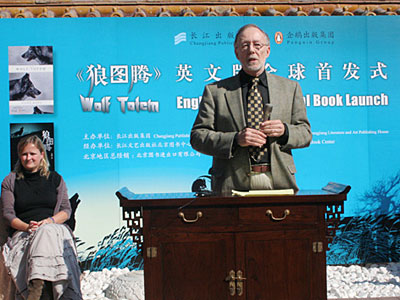| It is not unusual for a Chinese fiction to dominate the domestic market for several years. But can it also make a splash overseas? And what factors would contribute to this goal?
Wolf Totem is a legend Chinese novel that has topped the bestseller charts for four years since its publication. So far, about 2.4 million copies of the book have been sold and it has garnered increasing foreign media attention, including Time magazine, Guardian newspaper and AFP.
Recently, the book has been awarded the first Man Asian Literary Prize. This prompted international publisher Penguin Group to unveil the English version of Wolf Totem in Europe, Oceania and North and Latin America.

Veteran American translator Howard Goldblatt speaks at a promotional event for the English version of the Chinese novel Wolf Totem in Beijing on March 13, 2008.
(Photo: CRIENGLISH.com)
Howard Glodblatt is the person who helped to make the English version possible. The American is regarded as one of the most experienced translator of modern and contemporary Chinese literature in the West. His translations include masterpieces of renowned Chinese writers like Ba Jin, Su Tong, Feng Jicai and Mo Yan.
Goldblatt is a master of both English and Chinese and he humorously describes the request for him to translate the book as an arranged marriage in Asian countries. However, as he began to render the book into English, many subjects captured his attention. He recalled some in both Chinese and English.
"There are many. The whole idea of Tian'e Hu-the swan lake, and Xiaolang-the little wolf. And then the whole idea of life on the grassland--it is something I've never imagined in my whole life. We have that in the West, such as ranches and cows and all like that--but not like this, not with all the wolves out there, waiting to attack all the single day! It is fascinating."
Goldblatt reveals as a translator, he has to read between the lines and try to find the best English equivalent of some Chinese words or phrases. Sometimes he even has to make up an English word himself with additional explanations. That makes the translation more reader-friendly.
Complicated relationships between animals and humans, slowly developing narrative and simple and unrestrained lifestyle of nomads on the grassland are some major attractions of the book for the Chinese people. But to Goldblatt, who is among the first English-speaking readers, author Jiang Rong's academic background is equally interesting.
"Besides the content, the main difference in writing was that Jiang Rong is an academic, he is a scholar. He is a philosopher. He is not originally a novelist. So you could sense there is something other than what just the novelists can work. There is more non-literary aspect to his writing."
Nicholas Jose is a judge of the Man Asian Literary Prize. He holds similar opinion about the book.
"It is a philosophical book, dealing with big questions of the environment and different ways to live. It is also a real book. It tells the story based on the author's own life. And you can feel the reality. That is attractive."
Nicholas says although there are many foreign-language publications on present-day China in international markets, Wolf Totem explores something different.
"I guess people would be very interested in this book and they will be surprised by it. What we know is something about young people in Beijing or Shanghai. But this book is completely different. It is about the old generation of Chinese. This reflects their experience back in 1960s and 1970s when they were young. So that is interesting."
In accordance with the global launch of the English-language book this March, a series of activities will be held at both home and abroad, including an exhibition of grassland near Thames in London, a seminar on nomadic culture in Melbourne and an eco-friendly tour to Inner Mongolia where author Jiang Rong once lived.
(CRI March 14, 2008) | 